
- Will I be able to stay sober?
- Can I make it out there in the real world without relapsing?
- How will I cope if cravings come up?
- What will my life be like without drugs or alcohol?
- How will my friends, family and work colleagues see me now?
At The Dunes East Hampton, we set our clients up for maximum success after treatment by giving them tools to cope with cravings and adjust to life after treatment.
Prepare for Life in the Real World
After treatment, you will return home and face familiar routines, expectations, and relationships. Your world may include the same temptations and pressures. The outside world hasn’t changed, but you have. Relapse is real, and it often begins as a slippery slope – attending a cocktail hour work event can easily turn into drinks with colleagues. Planning and practice can prevent unavoidable life situations from destroying your hard-earned progress.
Below are some general tips to help you adjust to sober life. When you go through treatment at The Dunes, we help you create a customized plan specific to your situation.
Identify Your Triggers
During your time in treatment, we’ll help you uncover the triggers that could possibly lead you back to bad habits, then plan your reaction if you should find yourself in that situation. Triggers may include places, people, events, and thoughts. The inability to handle a trigger can increase the likelihood of relapse.
Keep Your Favorite Coping Mechanisms in Mind
Avoiding triggers and stressors altogether is ideal, but some triggers are unavoidable. You cannot directly control someone’s casual remarks, beliefs, or work situations. You can, however, build a toolbox of coping mechanisms to keep triggers from derailing your sobriety.
Mindfulness, negative thought identification, distraction, and other treatment-specific skills go with you beyond the haven of treatment. For example, specific coping mechanisms might include:
- Keeping a moldable piece of beeswax in your pocket to knead when you confront stressful situations.
- Taking a five-minute meditation break at work to keep you from feeling overwhelmed.
- Having a list of healthy recreational activities on your phone for those times when boredom sets in.
Build a Personal Support Network
 Everyone needs a healthy support network to hash out ideas, move past tough times, and celebrate successes. Even the most private of people need at least one person they can confide in away from treatment. Create a network of positive, well-balanced, and supportive people in your life. You may find strength in a religious community, your neighborhood, a work group, or fellow hobbyists.
Everyone needs a healthy support network to hash out ideas, move past tough times, and celebrate successes. Even the most private of people need at least one person they can confide in away from treatment. Create a network of positive, well-balanced, and supportive people in your life. You may find strength in a religious community, your neighborhood, a work group, or fellow hobbyists.
Healthy choices are much easier to make when others around you choose the same things. For example, look for people who:
- Grab sparkling water over a cocktail.
- Attend yoga instead of Friday night parties.
- Speak more to compliment and encourage than to gossip and ridicule.
- Accept without question if you need to say no to an activity in order to avoid a trigger.
Say Goodbye to What’s No Longer Serving You
While it’s relatively easy to see the value of forging wonderful new friendships, it can be more difficult to cut the ties of existing relationships. It’s important to do a relationship assessment and be honest with yourself about which relationships will support your sobriety and which will temp you in the wrong direction.
Friends
You may have good friends who you’ve partied with for years – you go way back, as the saying goes – and it may be hard to choose between them and staying sober. You can ask them to respect your new lifestyle, but they may not be. Here are some tips for handling this:
- Let them know what your new lifestyle needs to look like and how committed you are to staying sober.
- Suggest some alternative fun things you can do together.
- Observe their response and whether or not they’re willing to change their habits.
- If needed, respectfully let them know that your paths are going in separate directions, say goodbye and wish them well.
Family
Then there are those family members who are related to you by blood or marriage but don’t support you the way a loved one should. They generally come in two flavors:
- People who make you angry
- People who make you feel worthless or “less than”
Both types can drive you back into bad habits if you’re not wise to their influence. As part of treatment at The Dunes, we work with you to identify how different family members influence your emotions and reactions so you can avoid their control.
You can also avoid negative family members by:
- Declining invitations to events where you know the difficult family member will be present.
- Suggesting get-togethers only with those members of your family who support you in your new lifestyle.
- Mending fences with the people you love who may have distanced themselves from you because of your addiction.
If you decide to attend a family event because it’s the only way you can see some people you care about, but the difficult person will be there too, go prepared with your coping strategies firmly in mind.
Places and Activities
Certain places and events may hold a nostalgic place in your heart. If those events also involved substance use, and it can be difficult to stay away because of the good times you associate with them. This is why it’s critical to find new hangouts, new places and events where you can have a great time without substances. As you build fond memories of these new experiences, your desire to revisit the old stomping grounds will lessen, or at least provide an alternative when the mood strikes.
Find and Hold onto Confidence
Every morning is a new day to wake up with confidence and renew your resolve in recovery. You may not share your struggles with the world, but you deserve to feel proud for finding the discipline, motivation, and strength to eliminate a dangerous habit and move forward.
Recovery gives you a personal story of empowerment and the ability to overcome anything. Consider keeping a journal where you note things such as your daily accomplishments, what you’re grateful for, affirmational statements, and/or every positive choice you make and craving you overcome, no matter how small. You can write longhand or keep a simple list, in a physical journal or in a digital file – whatever is easiest for you.
Remember: You deserve inner self-confidence. Cherish that feeling.
Participate in Our Aftercare Program
It’s normal for newly sober individuals to confront challenges in the weeks and months after treatment. It takes time for sobriety to feel like part of your core – an unquestionable lifestyle. Until then, The Dunes East Hampton aftercare program can help.
Clients who participate in aftercare support receive a personalized program designed to help you through the first year of recovery. We continue to stay in touch, updating your plan based on your real-world experiences and eventually building out a five-year plan to transition to long-term recovery.
After you graduate, our doors are open to you to return for outpatient services if needed. We also hold regular alumni breakfasts so you can stay in touch with your support network here. For those who aren’t able to attend our treatment center for outpatient programs, we offer a digital teletherapy program.
We’re committed to helping you get clean and stay clean for a lifetime, which is why we provide ongoing support to help you build long-term habits and reduce the likelihood of relapse.







